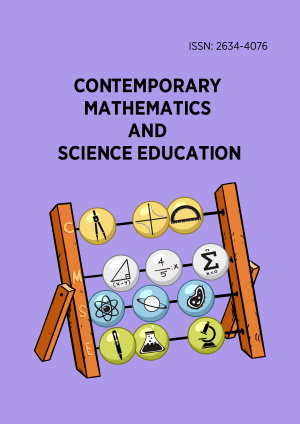Research Article
Complexity Arising from “Escape Room” Style Activities in A High School Calculus Class
More Detail
1 Maple Leaf International School - Wuhan, CHINA* Corresponding Author
Contemporary Mathematics and Science Education, 3(1), January 2022, ep22003, https://doi.org/10.30935/conmaths/11560
Submitted: 10 November 2021, Published: 14 January 2022
OPEN ACCESS 1083 Views 1636 Downloads
ABSTRACT
Traditional mathematics instruction serves many purposes in today’s education systems. Providing step-by-step guidance and lecture-style tuition in mathematics is often the norm. However, emerging insights into challenge, grit, and optimal teaching and learning strategies suggest that there may be benefit from increasing the mental burden on students. A short-term investigation was conducted into the use of choice, unstructured assessment and a “locked box” style of student-directed task for a high school calculus class of ESL students in China. Results were encouraging and suggested the emergence of a complex learning system composed of individual students that transcended the typical classroom experience.
Keywords:
calculus, complexity, emergence, puzzle-based, play-based, competition, collaboration, cooperation
CITATION (APA)
Carlgren, D., & Schultz, A. (2022). Complexity Arising from “Escape Room” Style Activities in A High School Calculus Class. Contemporary Mathematics and Science Education, 3(1), ep22003. https://doi.org/10.30935/conmaths/11560
REFERENCES
- AdvancEd. (2021). Frequently asked questions index. https://www.advanc-ed.org/sites/default/files/mobile_apps/eleot/eleot_faqs.pdf
- Cilliers, P. (1998). Complexity and postmodernism: Understanding complex systems. Routledge.
- Davis, B., Sumara, D, & Luce-Kapler, R. (2015). Engaging minds: Cultures of education and practices of teaching. Routledge. https://doi.org/10.4324/9781315695891
- De Lange, J. (1996). Using and applying mathematics in education. In A. C. Bishop (Ed.), International handbook of mathematics education (pp. 49-97). Kluwer Academic Publisher. https://doi.org/10.1007/978-94-009-1465-0_4
- Ernest, P. (2002). Empowerment in mathematics education. Philosophy of Mathematisc Education Journal, 15, 1-16. https://doi.org/10.4324/9780203497012
- Fu, F.-L., Wu, Y.-L., & Ho, H.-C. (2009). An investigation of coopetitive pedagogic design for knowledge creation in web-based learning. Computers & Education, 53(3) 550-562. https://doi.org/10.1016/j.compedu.2009.01.004
- Klymchuk, S. (2017). Puzzle-based learning in engineering mathematics: Students' attitudes. International Journal of Mathematical Education in Science and Technology, 48(7), 1106-1119. https://doi.org/10.1080/0020739X.2017.1327088
- Mullins, D. R., Rummel, N., & Spada, H. (2011). Are two heads always better than one? Differential effects of collaboration on students' computer-supported learning in mathematics. International Journal of Computer-Supported Collaborative Learning, 6(3), 421-443. https://doi.org/10.1007/s11412-011-9122-z
- Palm, T. (2009). Theory of authentic task situations. In L. Verschaffel, B. Greer, & W. Van Dooren (Eds.), Words and worlds: Modelling verbal descriptions of situations (pp. 3-17). Sense Publishers.
- Palm, T., & Burman, L. (2004). Reality in mathematics assessment: an analysis of task-reality concordance in Finnish and Swedish national assessments. Nordic Studies in Mathematics Education, 9(3), 1-38.
- Plass, J. L., O’Keefe, P. A., Homer, B. D., Case, J., Hayward, E. O., Stein, M., & Perlin, K. (2013). The impact of individual, competitive, and collaborative mathematics game play on learning, performance, and motivation. Journal of Educational Psychology, 105(4), 1050-1066. https://doi.org/10.1037/a0032688
- Schoenfeld, A. H. (1985). Mathematical problem solving. Academic Press.
- Selden, A., Selden, J., Hauk, S., & Mason, A. (2000). Why can't calculus students access their knowledge to solve nonroutine problems? Research in Mathematics Education, IV, Issues in Mathematical Education, 8, 128-153.
- Slavin, R. E. (1988). Cooperative learning and student achievement. Educational Leadership, 31-33.
- Thomas, C., Badger, M., Ventura-Medina, E., & Sangwin, C. (2013). Puzzle-based learning of mathematics in engineering. Engineering Education, 8(1), 122-134. https://doi.org/10.11120/ened.2013.00005

 The articles published in this journal are licensed under the CC-BY Creative Commons Attribution International License.
The articles published in this journal are licensed under the CC-BY Creative Commons Attribution International License.